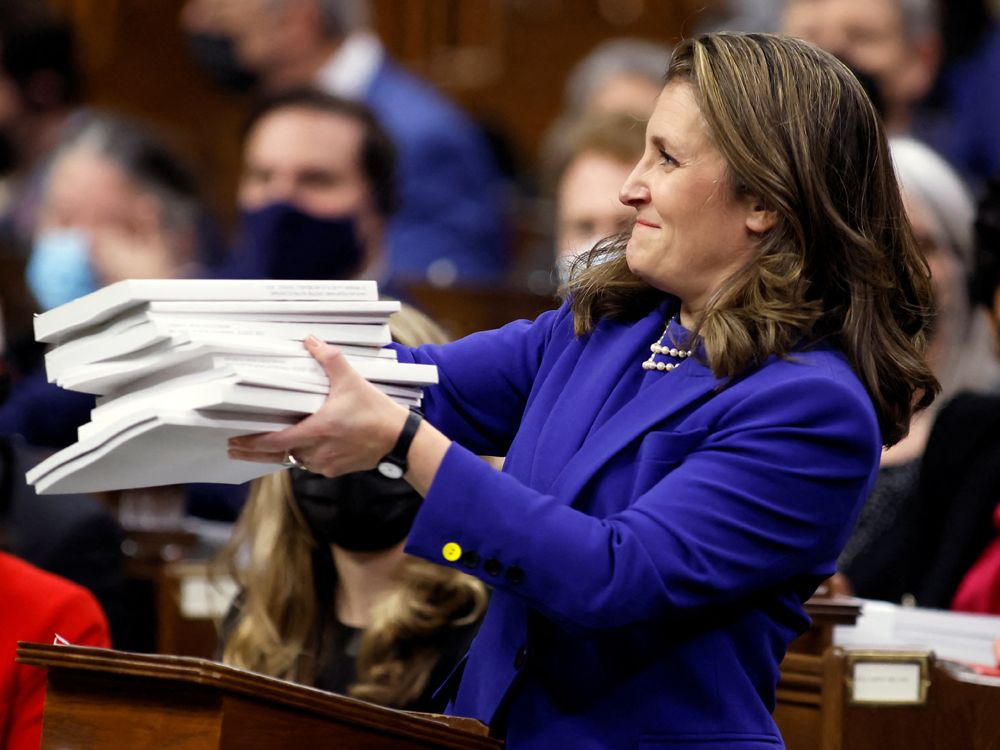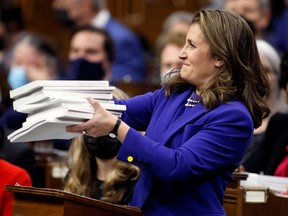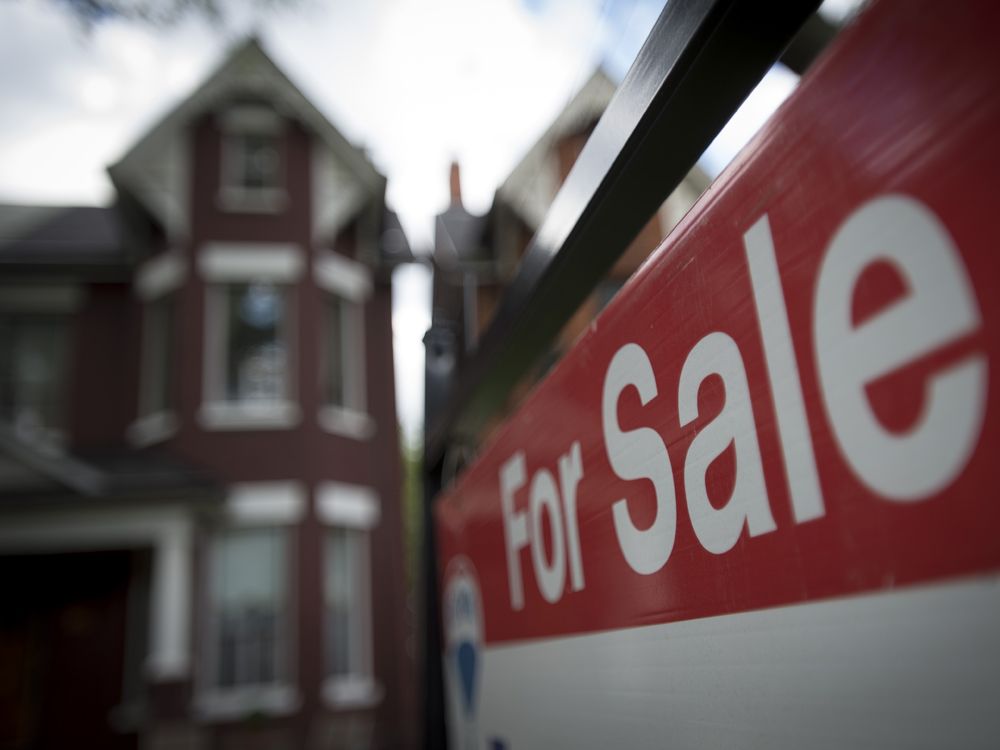What matters to business in Trudeau’s budget

From a 15% new tax on big bank profits to breaks for small business

Article content
The numbers
The federal government’s economic outlook is based on the forecasts of economists at 13 financial institutions and research outfits. The average of their forecasts sees economic growth of 3.9 per cent in 2022 and 3.1 per cent in 2023, and a jobless rate of about 5.5 per cent over the next two years, which would be historically low. Finance supplemented those estimates with a scenario analysis of what could happen if the war in Ukraine gets worse, and what might happen if Russia were to pull back. The former would result in growth of merely 0.4 per cent in 2023, while a better-than-expected outcome would see growth of four per cent next year.
Advertisement 2
Story continues below
Article content
The combination of inflation and stronger corporate profits left Finance Minister Chrystia Freeland with about $41 billion in unexpected revenue over the next five years. She resisted the urge to spend all of it. The budget predicts the deficit narrowed to $114 billion (4.6 per cent of gross domestic product) in the fiscal year that ended March 31, and will drop to $53 billion (two per cent of GDP) this year – on its way to $8.4 billion (0.3 per cent of GDP) in 2027.
Freeland’s “fiscal anchor” is a promise to keep debt as a percentage of GDP on a downward track. Her outlook achieves that commitment, although probably not as forcefully as some of her critics would like. The debt is currently about 46.5 per cent of GDP. The budget predicts it will slowly decline to 41.5 per cent of GDP over the next five years. The government is counting on a growing economy to keep the debt burden in check: in nominal terms, the debt is projected to rise to $1.3 trillion in five years from $1.2 trillion currently.
Advertisement 3
Story continues below
Article content
Housing
Ottawa took aim at Canada’s housing crisis with a $10-billion, three-pronged strategy that includes cracking down on speculators, aid for first-time homebuyers, and programs to increase supply.
One measure would prohibit foreign companies and non-Canadians from buying non-recreational residential property in Canada for two years. The budget also contains new rules to discourage property flipping.
A new Tax-Free First Home Savings Account, promised during last year’s election campaign, would give first-time homebuyers the ability to save up to $40,000. Like an RRSP, contributions would be tax-deductible, but withdrawals would also be tax-free, like a TFSA. The budget also proposes to double the First-Time Home Buyers’ Tax Credit amount to $10,000.
Advertisement 4
Story continues below
Article content
The Trudeau government would provide $4 billion over five years to the Canada Mortgage and Housing Corp. to launch a new Housing Accelerator Fund that aims to speed up housing development on a municipal level. The budget said the new fund would aim to create 100,000 new homes over the next five years.
Bank tax
The budget’s Canada Recovery Dividend would slap a one-time, 15-per-cent tax on income above $1 billion of Canada’s biggest banks and insurers. The financial institutions would also be hit with a permanent 1.5 percentage point increase in the corporate income tax rate on taxable income above $100 million.
Advertisement 5
Story continues below
Article content
Carbon capture
The government is making a huge bet on carbon-capture technology. Starting this year, and running through 2030, companies that invest in equipment that pulls carbon out of the air and stores it can apply for tax credits of 35 per cent, 50 per cent, and 60 per cent, depending on the type of gear purchased. The budget estimates the credits will cost $2.6 billion annually over the first five years, and then $1.5 billion per year through 2030. The government also included an incentive to companies to move now: the credits will be cut in half in 2031.
Read, “Trudeau proposes tax credit to cover 50% of carbon capture technology cost.”
Advertisement 6
Story continues below
Article content
Mineral supply
Canada and its allies appear committed to ending their dependence on autocratic nations to supply them with critical inputs. The new budget proposes allocating $3.8 billion between now and 2030 to develop “priority” critical minerals, including lithium, nickel, cobalt (batteries), as well as rare earth metals used in magnets found in electric vehicles. Some $1.5 billion was set aside to help pay for infrastructure to support the development of the critical minerals deposits and supply chains that will be required to get those minerals to factories for processing.
Read, “Ontario risks losing its auto crown as cheap, green power gives Quebec the EV edge.”
Innovation booster
The Canadian government is looking at models in Israel and Finland to build out a strategy to boost innovation and drive company growth. This will include the creation of an operationally independent federal innovation and investment agency, with $1 billion earmarked over five years to support its initial operations.
Advertisement 7
Story continues below
Article content
Read, “A wake-up call for startup funding in Canada.”
Canada growth fund
The budget also pledged to create a new public investment vehicle, initially capitalized with $15-billion, to drive “substantial” private sector investment to help meet national economic policy goals including emissions reduction, economic diversification, and restructuring of critical supply lines. The aim for Canada Growth Fund is to match every $1 with $3 from private sector investment.
Read, “If BlackBerry sells its patents, Ottawa should be first in line.”
-

Trudeau takes aim at foreign homebuyers in budget, promises tax-free homebuyers savings account
-

Big banks and insurers hit with one-time 15% tax on income over $1 billion — and that’s not all
-

Jamie Golombek: Here’s how the federal budget impacts your wallet
Advertisement 8
Story continues below
Article content
Small Business
The budget would raise the capital threshold for the lower small business tax rate of 9% from $15 million to $50 million before the 15% tax rate kicks in. Government says this would allow more medium-sized business to benefit and deliver $660 million in tax savings over five years.
Employee ownership trusts
To encourage employee-owned businesses the budget would create the Employee Ownership Trust, a new, dedicated type of trust under the Income Tax Act to support employee ownership.
Advertisement
Story continues below








